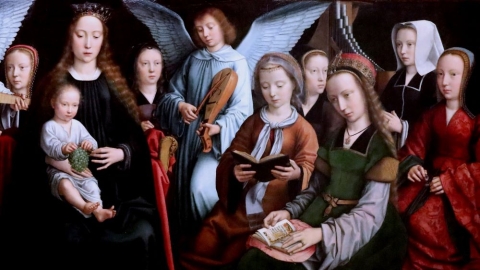The Sufferings Endured by Mary Had No Value of Punishment

Adam and Eve, our first parents, received from God, along with sanctifying grace, some very special “preternatural” gifts. The definition of which means that said gifts were not a normal part of human nature, but had been added by God to embellish and enrich the first created couple.
One among these gifts was impassibility. Given that the human body is passible, meaning in the first sense that it feels needs, i.e., necessities linked to the human condition, which is partly material. But the term passible is also used to designate the passions, desires, or sensible appetites.
Our Lord Jesus Christ possessed these two forms of passibility, because He was perfectly man. He felt needs like hunger and thirst – as indicated during his forty days fast in the desert – and all the corporal needs of a man in good health. He could also feel all the human sentiments.
There was only one difference between the man-God and all other men: because of the perfect constitution of His human nature, His sentiments could never take on a momentum or proportion that was not dominated by His will. His passions were thus perfectly submitted to His reason, which is why theology gives them a particular name: propassions.
It is therefore evident that Our Lady possessed the same passibility, as much regarding needs as feelings and passions. But like her divine Son, her passions could never hinder the exercise of her reason, nor control her in any way: she dominated them perfectly.
It follows from this that the Most Holy Virgin, like her Son, could suffer in her body as well as in her soul. She says so herself: “And seeing Him, they wondered. And His mother said to Him: Son, why hast Thou done so to us? behold Thy father and I have sought thee sorrowing,” (Lk. 2:48).
So, Our Lady had a certain ignorance, and suffered from the anguish. If God allowed this, it is because it was suitable for the fulfillment of the plan of Redemption. In this way she was able to perfectly imitate her Son and participate in the satisfaction that He offered to His Father. She also gave an example of virtue, hence the devotion to the compassion of the Mother of God.
But there is a fundamental difference between the Virgin, our Mother, and ourselves
Indeed, we are subject to suffering for two reasons. The first reason is because any material being can deteriorate, and, for the living, to suffer sickness or injuries. In that respect, Christ as well as His Mother could suffer. The only absolutely indefectible being is God.
But we must be subject to the cross of our existence also because of sin which has disordered nature and merits chastisement: it is the evil of pain. Let us not forget that sin makes us lose the preternatural gifts. In this way, the disorder of sin and the allowance of evil as chastisement for sin are at the origin of our sufferings here on earth.
But as there never was any sin in the Mother of God, there was no reason for her to be afflicted with suffering because of a sin, be it only original sin.
In other words, Mary’s sufferings were not a chastisement for her. She freely accepted them in union with her Son, in order to restore the honor of God and to accomplish the salvation of souls.
Let us desire in our heart to thank her for it, and to glorify God for the marvels that He has accomplished in the Mother of His incarnate Son, who is also our Mother.
Related links
Illlustration : Flickr /Fr Lawrence Lew, O.P. (CC BY-NC-ND 2.0)





